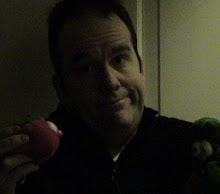Evolutionary Monkey Business
Newsweek's magazine for College students, Current, has a very interesting article "Monkey Business," on the campus presence of students who do not accept evolution. As the author, Victoria Bosch (a senior at Penn State University) suggests,
Each year, students who are not convinced by evolution enter college classrooms. These students are often nervous about how their beliefs will affect their grades in natural science courses. Their backgrounds are varied; many who believe in creationism or intelligent design describe themselves as evangelical Christians, like Scott, but others are Muslim, agnostic, or even atheist. Some think the Biblical explanation of the beginning of life is literally accurate, that life began in the days after an omnipotent god created the Earth. Others think that life began with small organisms and that the evolutionary process that did occur with our development was guided by a deity. Still others think that evolutionary theory lacks the necessary support to make it believable.
Further: Though there are few firm statistics, it is clear that not everyone with a university degree hanging on the wall believes in evolution. A CBS News poll released in October 2005 stated that 15 percent of all Americans believe that humans evolved without the guidance of a god; other respondents believe either that humans evolved with God's guidance or that humans were created by God in their present form. The numbers alter only slightly among Americans with at least one college degree, 24 percent of whom believe in evolution. Young Americans are more likely to believe in evolution, possibly a result of a 1987 Supreme Court ruling that forbade public schools from teaching creationism as fact. Even so, large numbers of students on college campuses remain ill at ease with their professors' assertions that the world dates back to the Big Bang, not to the Garden of Eden.
Quite an article that is VERY non-P.C.
In other Evolution news. . .
The January 1, 2006 issue of The New York Times featured an opinion column by Olivia Judson, an evolutionary biologist at London's Imperial Hospital. In "Why I'm Happy I Evolved," she gushes about her pleasure in being the product of purely natural and material forces and processes.
She argues:
Some people want to think of humans as the product of a special creation, separate from other living things. I am not among them; I am glad it is not so. I am proud to be part of the riot of nature, to know that the same forces that produced me also produced bees, giant ferns and microbes that live at the bottom of the sea.
For me, the knowledge that we evolved is a source of solace and hope. I find it a relief that plagues and cancers and wasp larvae that eat caterpillars alive are the result of the impartial - and comprehensible - forces of evolution rather than the caprices of a deity.
More than that, I find that in viewing ourselves as one species out of hundreds of millions, we become more remarkable, not less so. No other animal that I have heard of can live so peaceably in such close quarters with so many individuals that are unrelated. No other animal routinely bothers to help the sick and the dying, or tries to save those hurt in an earthquake or flood. Which is not to say that we are all we might wish to be. But in putting ourselves into our place in nature, in comparing ourselves with other species, we have a real hope of reaching a better understanding, and appreciation, of ourselves.
She is glad to be part of the "riot of nature." She is relieved to believe "that plagues and cancers
and wasp larvae that eat caterpillars alive are the result of the impartial - and comprehensible -- forces of evolution rather than the caprices of a deity." But all she can then say about the wonder of humanity is that we "can live so peaceably in such close quarters with so many individuals that are unrelated." She also points to examples of human altruism. But that is it. What about war and violence? Like Thomas Hobbes, some observers would suggest that hatred and violence, oppression and bloodshed, murder and mayhem, would better describe the nature of our species.
The materialistic worldview cannot explain why humanity should be considered to be more worthy of concern or of respect than the rest of the natural world. Given this worldview, some would plausibly argue that humanity does more harm than good on the planet. Meanwhile, the Christian worldview explains why humanity matters, and why human beings are capable of committing both great deeds of altruism and awful deeds of mayhem.
All this aside, Olivia Judson is perfectly pleased to consider herself, and all the rest of us, to have evolved.
Subscribe to:
Post Comments (Atom)

No comments:
Post a Comment